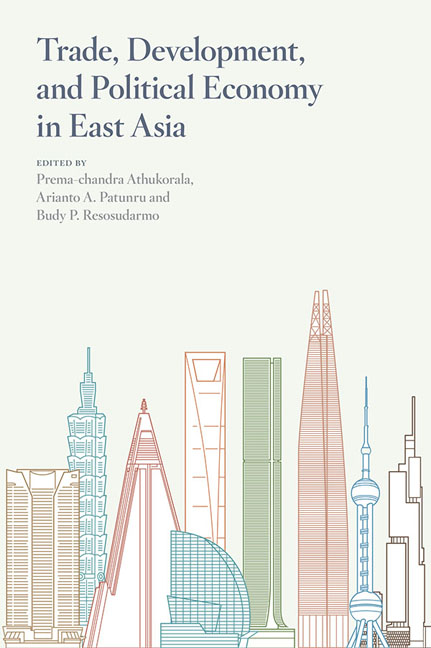Book contents
- Frontmatter
- Contents
- Tables
- Figures
- Contributors
- Foreword
- Acknowledgments
- Glossary
- 1 Introduction
- PART 1 TRADE
- PART 2 DEVELOPMENT
- 5 Economic relations between China, India and Southeast Asia: coping with threats and opportunities
- 6 Revisiting the growth acceleration episodes of Indonesia and India: a political economy reading
- 7 Exporting, education, and wage differentials between foreign multinationals and local plants in Indonesian and Malaysian manufacturing
- 8 Indonesia: returns to occupation, education, and ability during a resource export boom
- 9 Labour market regulation and employment during the Yudhoyono years in Indonesia
- 10 Vietnam: trapped on the trail of the tigers?
- PART 3 POLITICAL ECONOMY
- References
- Index
8 - Indonesia: returns to occupation, education, and ability during a resource export boom
from PART 2 - DEVELOPMENT
Published online by Cambridge University Press: 19 May 2017
- Frontmatter
- Contents
- Tables
- Figures
- Contributors
- Foreword
- Acknowledgments
- Glossary
- 1 Introduction
- PART 1 TRADE
- PART 2 DEVELOPMENT
- 5 Economic relations between China, India and Southeast Asia: coping with threats and opportunities
- 6 Revisiting the growth acceleration episodes of Indonesia and India: a political economy reading
- 7 Exporting, education, and wage differentials between foreign multinationals and local plants in Indonesian and Malaysian manufacturing
- 8 Indonesia: returns to occupation, education, and ability during a resource export boom
- 9 Labour market regulation and employment during the Yudhoyono years in Indonesia
- 10 Vietnam: trapped on the trail of the tigers?
- PART 3 POLITICAL ECONOMY
- References
- Index
Summary
This chapter examines the effects of the recent resources boom and the government policy response on the structure of employment and incentives for human capital investments in the Indonesian economy. The key focus of the chapter is on the slow manufacturing growth and its implications for the demand for labour and, in particular, human capital development in the economy. It is argued that, in the absence of countervailing policies to mitigate the Dutch disease effects on the manufacturing sector, the resource export boom will tend to reduce growth of ‘good’ (i.e. skilled) jobs and will lower returns to education, especially at more advanced levels. In the long term the economy may, therefore, be less well positioned to make a transition to growth based on skills and innovation, but avoiding the ‘middle-income trap’.
The chapter begins with an overview of structural changes in the economy from a historical perspective, with a focus on how the resource export boom and government policy response impacts on manufacturing performance and the theoretical underpinnings of the postulated relationship between manufacturing performance and return to education. The next section provides an analytical narrative of the changing structure of employment and real wages in Indonesia. The following section reports the results of an econometric analysis of the impact of changes in the structure of labour-demand earnings, job security, returns to skills, and other factors likely to influence long-term economic wellbeing. The final section presents a summary of the key findings and policy implications.
INDONESIAN GROWTH AND STRUCTURAL CHANGE IN THE 2000s
In the 1980s and 1990s, the share of manufacturing in Indonesian GDP and merchandise exports increased continuously. At their peak in 2000, manufactures accounted for 29 percent of GDP and 57 percent of merchandise exports. In the subsequent decade, there has been a notable decline in these shares, falling to 24 percent of GDP and 34 percent of exports by 2012—the same as their 1993–94 levels.
The time pattern of manufacturing's share of GDP is generally expected to be non-linear as, with rising wealth, skill-intensive services become increasingly important sources of comparative advantage and income. Thus, the timing, pace, and extent of the decline in Indonesia appears unusual. This is evident in Figure 8.1, which plots manufacturing's share of GDP against the log of per capita income for a comparable group of East and Southeast Asian economies.
- Type
- Chapter
- Information
- Trade, Development, and Political Economy in East AsiaEssays in Honour of Hal Hill, pp. 134 - 152Publisher: ISEAS–Yusof Ishak InstitutePrint publication year: 2014

